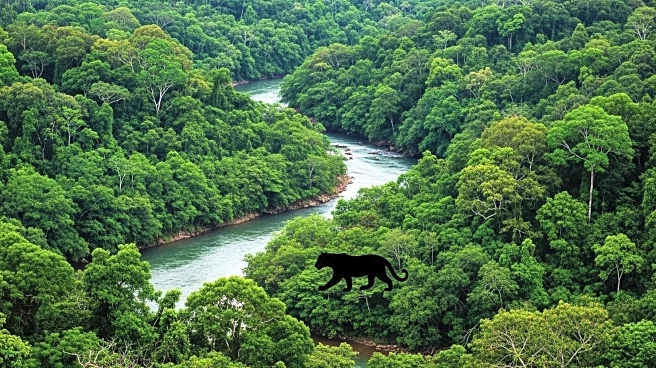What's Happening?
The Jaguar Rivers Initiative has announced a project to establish ecological corridors covering 2.5 million km² across Brazil, Argentina, Bolivia, and Paraguay. This initiative aims to restore biodiversity by reintroducing key species and creating protected areas within the Paraná River basin. The corridors will utilize the Paraguay, Iguaçu, Paraná, Pilcomayo, and Bermejo rivers and surrounding forests as pathways for wildlife movement and refuge. The project categorizes the territory into 'arks' with high biodiversity, buffer zones for sustainable activities, 'trampolines' for species dispersal, and rivers with wetlands. The initiative focuses on the Pantanal in Mato Grosso do Sul and Mato Grosso, and the Atlantic Forest in Paraná, where jaguars are critically endangered. The project also emphasizes involving local populations, including Indigenous and riverine communities, to develop a nature-based economy through ecotourism and other activities.
Why It's Important?
This project is significant as it addresses biodiversity loss and aims to restore ecological balance in a region known for its rich natural resources. By involving local communities, the initiative seeks to create sustainable economic opportunities, potentially improving the livelihoods of Indigenous and riverine populations. The focus on key species like jaguars, giant otters, and tapirs highlights the importance of preserving these animals for ecosystem health. The project could serve as a model for similar conservation efforts globally, demonstrating how ecological restoration can coexist with economic development. The initiative's success may influence environmental policies and conservation strategies in other biodiversity-rich areas.
What's Next?
The next steps involve detailed planning and implementation of the ecological corridors, including collaboration with local governments and communities. Monitoring and evaluation will be crucial to assess the project's impact on biodiversity and local economies. Stakeholders may need to address challenges such as land use conflicts and funding requirements. The initiative could prompt further conservation projects in the region, potentially attracting international support and investment. As the project progresses, it may influence regional environmental policies and encourage similar efforts in other parts of the world.
Beyond the Headlines
The project raises ethical considerations regarding the involvement of Indigenous and local communities in conservation efforts. Ensuring that these populations benefit from the initiative without compromising their cultural heritage is crucial. The project also highlights the importance of balancing ecological restoration with economic development, a challenge faced by many conservation efforts worldwide. Long-term success will depend on maintaining community engagement and securing sustainable funding sources. The initiative could lead to increased awareness and advocacy for biodiversity conservation, influencing public attitudes and policy decisions.









